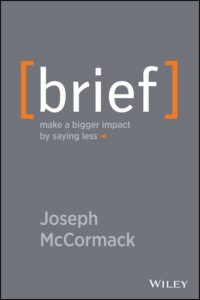Have you ever tuned out in a meeting because the speaker is rambling?
Do you find your mind wandering when listening?
What happens when someone does not get to the point?
Recently, I read BRIEF: Make a Bigger Impact by Saying Less by Joseph McCormack. He is the founder of a boutique marketing agency, The Sheffield Company, with clients ranging from Harley-Davidson to MasterCard. I had the opportunity to ask him a few questions about the power of brevity.
I love the message of this book. In my interactions, I am constantly asking for headlines and bottom lines. Or I am famous for flipping to the last page of the PowerPoint to see where it all ends. Why is brevity more important today than ever before?
We have passed the point where people can handle the volumes of information that’s headed their way. The result is a divided mind that is highly inattentive and constantly interrupted. The average attention span is now eight seconds, which is one second less than a goldfish. People that cannot get to the point and command others’ (in)attention face the real risk of being ignored and overlooked.
You discuss what you call the 7 Capital Sins that interfere with the goal. In your work, have you seen one or two that consistently rank the highest for busy executives?
The 7 Capital Sins are: cowardice, confidence, callousness, comfort, confusion, complication, and carelessness. They represent the subtle, and often unconscious, sins that can keep up from being succinct naturally, and I go into them more in-depth and provide strategies to circumvent them in my book.
7 Capital Sins
- Cowardice
- Confidence
- Callousness
- Comfort
- Confusion
- Complication
- Carelessness
Confidence and comfort, in particular, are two sins committed often by professionals, particularly senior executives. When people are knowledgeable and have authority, they tend to be so confident that they want to share everything they know. Given their position of responsibility, those around them have little choice but to buckle themselves in for a long ride. In a similar vein, executives are proud and fall in love with the sound of their own voice. They get so comfortable that it’s like a snowball running down a steep hill.
Storytelling is powerful. Why does storytelling trump persuasion?
Nobody wants to be sold to anymore. Our guard is up when we think someone is being pushy, and we stop listening to them. This isn’t good, of course, when you’re selling a product, service or even an idea. Given how inattentive people already are, this resistance shuts off even more listening. A story, however, has the exact opposite effect. People love them because they’re more human, logical, sequential and conclusive – all the elements to ensure the message gets through to the listener the first time.
Listening is something most of us struggle with, to truly listen to what matters. How does the skill of listening relate to brevity?
Brevity is really about giving people the right amount of information they need. Listening not only gives them time to speak, but also helps you know what matters to them. It also gives them the chance to respond and show they’re connected. If you don’t stop talking, you have no way of knowing if you’re being heard.
Why do most people struggle to be brief?
It’s hard to say less when there’s so much to say and (now) even more ways to say it. It’s like the world has given everyone a microphone and they love using it. The book is a strong reminder that they can’t forget about their audience and the real risk of being tuned out by them.
 Do our schools teach students to be brief? In my opinion, the business world values direct communication yet higher education often teaches the opposite. Often the “minimum word count” is the starting point for a grade, and the longer the essay, the higher the grade. I would love to see the opposite put in place.
Do our schools teach students to be brief? In my opinion, the business world values direct communication yet higher education often teaches the opposite. Often the “minimum word count” is the starting point for a grade, and the longer the essay, the higher the grade. I would love to see the opposite put in place.
Our academic system still doesn’t value brevity. Students still write for length and maximum word count. There are exceptions, but many teachers drone on because their pupils are considered a captive audience. I’ve heard of exceptional teachers, however, who realize they need to break up the classroom material into smaller portions because students easily drift out.
You must hear this often. You wrote a 234 page book called “brief” on the art of saying less! How do you respond to this?
I got paid by the word. Not really, I’m kidding. The primary reason is that old habits die hard and a thorough tour of why, how and where to be brief is needed in that many pages. Enough said.

